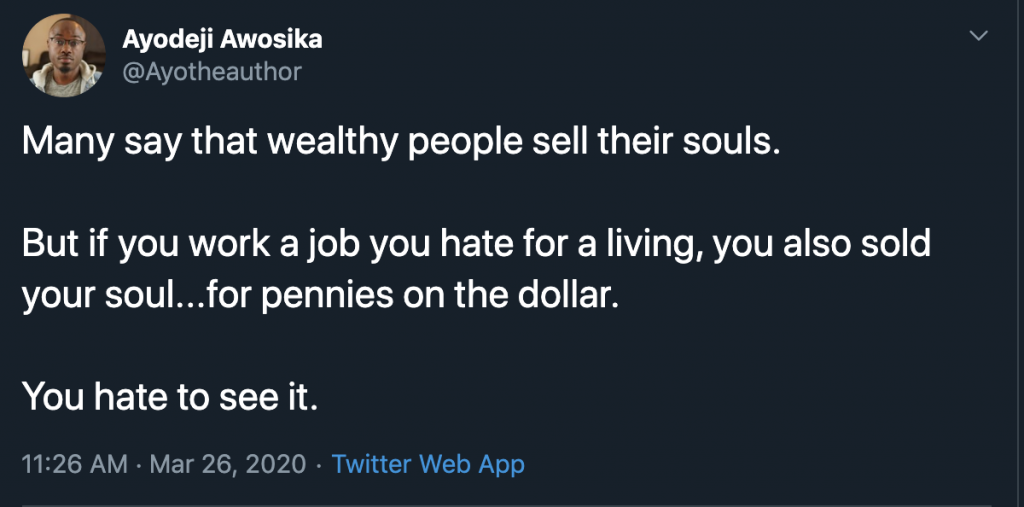
“Job security” is a myth. We saw that in 2008 and we’re seeing that right now.
You can spend a long period of time feeling ‘safe’ only to have the rug pulled from underneath you and experience a cascading effect of negative scenarios.
You can go from having a nice stable job, living paycheck to paycheck with debts because you’re stable so why not, and when a situation hits you out of nowhere, you can lose that job, your home, and a third of your 401k just like that.
This idea of the ‘illusion of safety’ doesn’t just apply to jobs, it applies to life. People play it safe and make prudent plans for the future, only to die young.
You’re lulled into complacency.
You think you have time.
You think you’re safe, but you’re not.
Most people live their lives as sitting ducks. Everything is fine until it’s not. Actually, as Nassim Taleb points out, they’re sitting turkeys:
“Consider a turkey that is fed every day, Every single feeding will firm up the bird’s belief that it is the general rule of life to be fed every day by friendly members of the human race ‘looking out for its best interests,’ as a politician would say. On the afternoon of the Wednesday before Thanksgiving, something unexpected will happen to the turkey. It will incur a revision of belief.”
If there’s no such thing as a truly safe position, why not swing for the fences?
You’re afraid. That’s it. Fear can be healthy, but you’re pointing it in the wrong direction.
You should be deathly afraid of being that damn turkey.
The Pragmatic Mathematics of “Worldly Success”
I’m writing this during the time of the covid-19 pandemic. Ironically, a bunch of people went out to the store to grab a decade’s worth of toilet paper, but many of them can’t see how this level of preparation should apply to their own lives.
What do I mean?
Many of these toilet paper hoarders will say things like “I’m content” or “I don’t care about money” but because they don’t go big by trying to earn, save, and invest enough of it, they set themselves up to fall off a cliff at any moment.
Reading the book the 10x rule cemented this idea in my mind, that it’s pragmatic to be really successful. Here’s a quote from an article I wrote about the book:
There’s a quote from Warren Buffet that says, “When the tide goes out you’ll see who’s swimming naked.”
The 10x rule isn’t just an exercise in lofty thinking. It’s a hedge against the tightrope of average results.
There’s nothing wrong with average thinking, average planning, and average amounts of action…as long as everything goes smoothly. But as soon as situations go south, failure to set big enough targets causes massive pain.
Just look at these examples:
- Most Americans grossly underestimate how much money they need to retire.
- Many are living paycheck to paycheck and have no savings.
- The average household has piles of debt (would you survive a repeat of 2008?)
- Most businesses fail because they underestimate how much cash they’ll need to survive lean times
- Almost all people with ‘revolutionary’ ideas severely underestimate how much effort it will take to execute those ideas
Living an abundant lifestyle isn’t just pleasurable, it protects you. Society emphasizes the virtue of mediocrity, but all morality aside, mediocrity is mathematically and pragmatically not good because it can all be swept away in the tide of circumstances.
Stop looking at making a lot of money, having multiple income streams, and having a platform to promote them all as a luxury. Having 10x of the resources you need is a necessity.
Being in the middle is the worst position. You’re not poor enough to get massive assistance from the government and you’re not rich enough to know and use all the loopholes. The poor have no money and the rich aren’t going to let you take theirs without a fight, so guess where all the wealth gets siphoned from? The middle.

You do all this work to build a middle-class lifestyle, only to get screwed for it in the long run. The crazy thing about it all? You could put the same level of work into different vehicles and get a much higher reward for it.
But most people double down on what they know, constantly susceptible, ignoring times like 2008 and covid-19 that temporarily shatter the illusion of safety.
Be different. Go big. And understand the safety that comes from living a risky life.
How to Go Big (Without Taking Major Risks)
The process itself is simple. It may take you a half-decade to pull off, but it’s simple nonetheless.
Keep your job and focus on building a dream on the side. Choose a project with high upside and low downside, e.g., most online business models have relatively low capital requirements to start. Begin this project with the attitude of a hobbyist and gradually get more serious as the project takes off and makes more money.
Squirrel away the difference and build a reserve of cash that makes you feel comfortable enough to quit your job. I chose six months of cash as my target. Make sure you continue to earn a level of revenue that matches or exceeds your job revenue for a time you deem fit. I chose six months for this as well.
Then, quit your job and enter the risky world that’s counterintuitively safer.
What do I mean?
Here’s an anecdote to describe the phenomenon. Accidents can occur more in areas where there are many street signs. Street signs make people feel safer so they pay less attention behind the wheel.
Then you’ll see extremely busy roads with no traffic signs in places like India where busses, cars, motorcycles, and bikes all somehow drive seamlessly on the road. Why? Because everyone has a level of hyperawareness.
When you strike out on your own, you develop a healthy level of paranoia. You can’t afford to fall asleep at the wheel. This helps you build redundancies in your life that provide more safety. You’ll build one income stream and realize you’re in the same position as you were when you had a job, so you’ll build another, and another, and another.
Also, once you get accustomed to making more money, you’ll never want to go back. A level of income you used to be just fine with will become unacceptable once you make more. This psychological anchor drives you to stay productive.
I’ve focused mostly on careers, business, and money, but this idea extends beyond those areas and into your life as a whole.
Level Up Your Entire Life
The illusion of safety doesn’t just apply to money. It applies to:
- Health
- Relationships
- Your happiness and peace of mind
I’m 30. I’ve started getting serious about my health because I see my peers who ‘think they have time’ to get it right who are, frankly, already paving the path to an early grave. I see that far in advance. They don’t.
Admittedly, when I got married, I thought my job was done. Both parties were to blame in the split, but when it comes to relationships, if you don’t actively work on making them as amazing as you possibly can, they won’t last. Many people get into relationships, especially marriages, and just give up on their personal development altogether because they think they’re “locked in.”
When it comes to your happiness and peace of mind, you want to avoid the slow trap — the frog in the boiling water fable. You think you’re happy playing it safe, coasting along, putting off those amazing experiences, but then one day you look up and you ask yourself “What the hell have I done with my life?”
Is the goal here to be an extremely rich world traveler, who’s in perfect shape – ripped from head to toe, who has a trophy partner, and experiences ultimate bliss? No.
The goal here is to overshoot on every aspect of your life.
Just in case.
You’re better off going too hard and realizing you overdid it than living an underwhelming life.
You want to live the type of life where you went so big and did so much that if you knew you were going to die today you’d be ok with it.
And you work on this every day because you know you don’t have time, because you know you’re not safe, because you know the mere fact you exist makes everything risky.
Why isn’t this the default option?
Ask yourself these questions, deeply, and do something amazing with the answer.